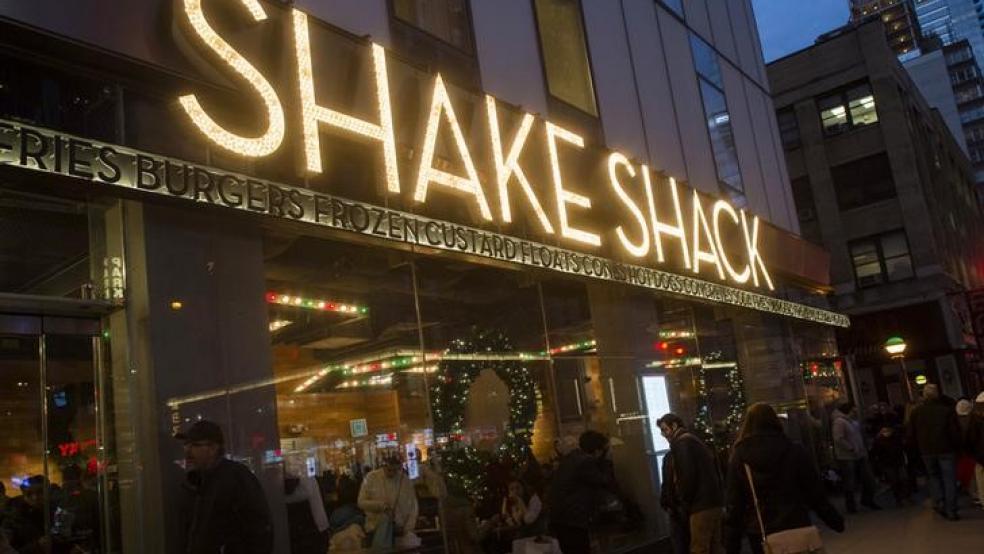Hot off the grill, Shake Shack (NYSE:SHAK) shares more than doubled in their first day of trading, serving up a whopping $1.7 billion valuation for the New York-based burger joint.
That price action is even better than some of the hottest recent tech IPOs. Online storage provider Box (NYSE:BOX) went public in January and jumped nearly 80 percent in its first day of trading. Chinese online retailer Alibaba (NASDAQ:BABA) was the world’s biggest IPO last September. Its stock jumped 38 percent in its first day of trading. Shake Shack’s opening day pop of 130 percent is even higher.
Related: Everything You Need to Know About Shake Shack’s IPO
That pop has left Shake Shack stock trading at about 15.2 times sales — or “just shy of Facebook’s 16.1 and topping all but five companies in the Standard & Poor’s 500 Index,” according to Bloomberg.
But Shake Shack differs from tech companies in ways that may dampen its future stock price gains once the hype dies down. "The restaurant business is intensely competitive, with few if any barriers to entry,” says Jay Ritter, a finance professor at the University of Florida. “Earning an above-average return on capital is difficult." He sums up: "To justify a $1.7 billion valuation, an awful lot of things have to go right." At $48 a share, or $27 million per restaurant, there is “substantial downside risk," says Ritter.
Here are four key differences (that Wall Street cares about) between Shake Shake and a hot tech IPO:
1. Shake Shack has profits! But margins are low. While tech companies often go public when they are still losing money, established tech firms boast profit margins that can easily top 40 percent. But Shake Shack’s profit margin is just 4 percent in recent filings. Its recent annual profits were just $660,000.
2. Shake Shack’s growth is slower — and slowing down. Its quarterly revenue growth is 40 percent higher than a year ago. That’s pretty fast, but revenues are relatively small at just $107 million and, so far, sales at restaurants opened outside of New York City aren’t as high. In contrast, Box revenues grew 70 percent year-over-year in its most recent quarter.
Related: 11 Worst Fast Food Restaurants in America
3. Burgers are a developed market. Suffice it to say, taking market share from other hamburger chains is not impossible, but is harder than creating a whole new market with a hot new tech product. Chipotle Mexican Grill (NYSE:CMG) and Starbucks (NASDAQ:SBUX) have shown they can grow and earn strong profits, says Ritter. But competition is particularly fierce in the burger biz. "A lot of other restaurant chains are selling fancy hamburgers," he says, citing Applebee’s, operated by DineEquity, Inc. (NYSE:DIN) and Habit Restaurants (NASDAQ:HABT) as just two.
4. Burgers don’t easily scale. Can you say “bricks and mortar?” Now with only 63 outlets, Shake Shack management admits that it can’t grow too fast and maintain the same quality. A tech company that can grow fast without a lot of additional investment is what Wall Street loves. “Most tech startups are capital light so they can grow without needing to invest so much money,” says Peter Cohan, a management consultant and venture capitalist. “Shake Shack's growth rate is slowing down and in order to sustain growth it will need to pour in huge amounts of capital.”
Top Reads from The Fiscal Times:





